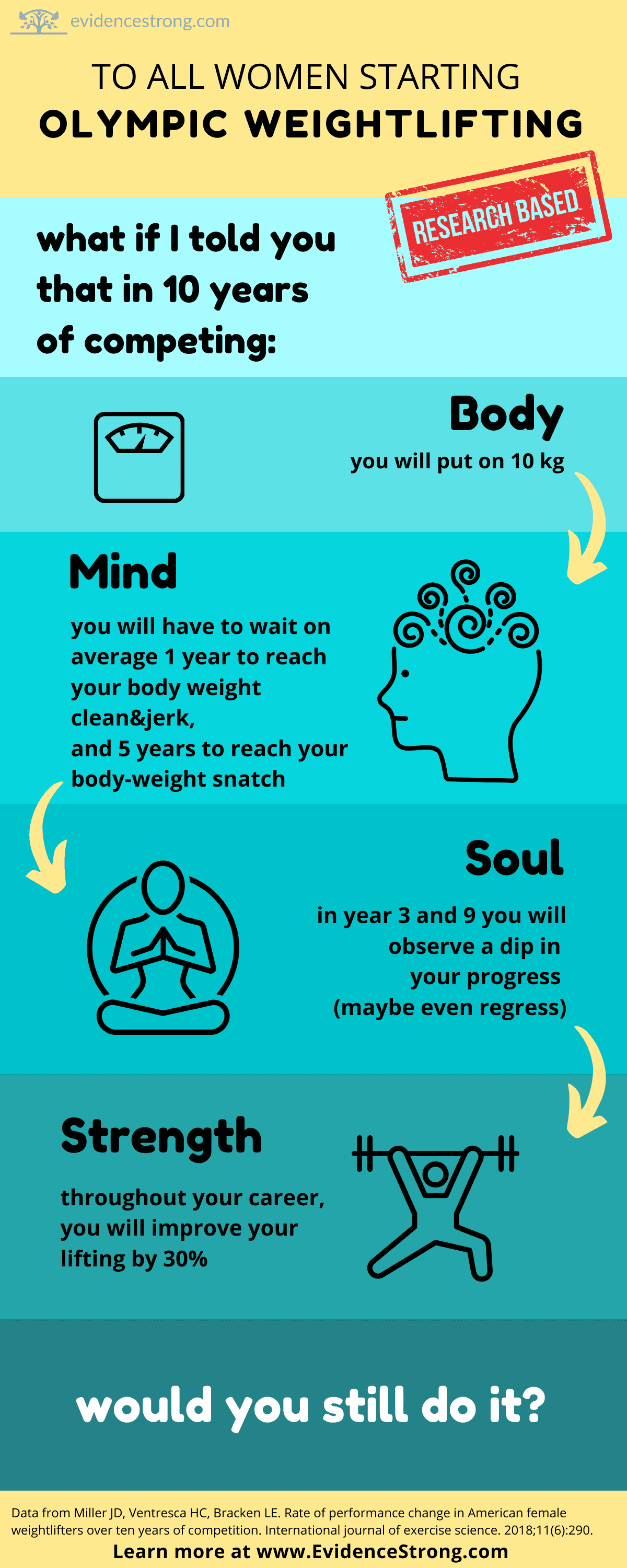You have just started Olympic weightlifting and you are so pumped.
You have learned snatch and clean & jerk, maybe they are not perfect yet, but you are slaying it and having so much fun.
You may start wondering:
- if I train for the next 10 years, what will happen?
- Will I get absurdly strong?
- Will I get bulky?
- Will there be any downs?
Is there a way to look in the future?
Of course not. But we have a way to predict it in an average, statistical way. Are you average? No, you are special (really, really ;)). But using statistics of other people is the best we can do to predict your future, so strap in and let’s have a look at scientific data.
Body
Your body will change by doing Olympic weightlifting.
In the first 3 years, you will be learning technique and getting your existing muscles stronger. After that, the body will need to grow more muscles to sustain performance gains. This probably means putting on weight, as growing muscles will weigh more.
Also, it is useful to remember that any body mass gain, coming from muscle or fat gains, will influence the body’s ability to produce force. Force is proportional to the mass (does not matter if it is fat), the more mass, the bigger force. So lifters who are able to stay more or less fast and put on weight, will produce more force, and possibly be able to lift heavier.
The changes in body weight may also relate to purposefully moving between weight classes to reach a competetive advantage.
Ok, it is clear that gaining weight may bring advantage in Olympic weightlifting. How much is optimal?
Data showed, that on average, competitive (international level) female weigthlifters were putting on 10 kg of body weight over 10 years of their career. Weight gain was especially important from year 3 as it allowed to improve how fast the athletes were improving.
Is it an acceptable trade off for you? Can you accept putting on weight to improve your lifts?
Mind
Weightlifting will play with your mind.
Olympic weightlifting is a strength-based sport. Strength takes time to develop. It is also very technical which imposes substantial neurological demands.
Unless you are a genetic freak, it will take you some time to develop the technique, mobility and strength to perform the lifts on a high level. It will teach you hard work and patience.
Data shows that you will have to wait on average 1 year to reach your body weight clean & jerk, and 5 years to reach your body-weight snatch.
Can you wait that long?
Soul
Weightlifting will touch your soul.
Rate of development (how fast you get stronger or progress) is the fastest at the beginning, but slows down significantly over the years. You will never progress as fast as you progress now. Are you ok with that?
Many other things influence how fast or slow you progress including your training, diet and recovery practices. One of the things that can slow you down for example are injuries. These are hard to predict and therefore hard to prevent. Are you prepared?
Some of the downs can be predicted though on the base of the data we have: In year 3 and 9 female weightlifters observed a dip in their progress (maybe even regress).
Can you survive seeing your total stuck for a while?
Strength
Weightlifting will definitely make you stronger. It may make you more flexible too.
Data shows that over 10 years of competitive career, female weightlifters improved their snatch, clean & jerk and total around 30%. It took them on average 8.5 years to get there.
Is becoming 30% better enough of a promise for 8.5 years spent in the weightlifting gym?
Final words
The data I am referring to here are for young athletes, who start their training when they were kids. These data are a statistical representation of a set of female weighlifters who lifted up to 2017.
If you are starting your weightlifing journey now as a kid, should your numbers, progress, gains be the same? We don’t know.
If you are someone who has started weightlifting in your 20’s, 30’s or later, these numbers definitely do not apply to you… Or do they?
Will you still do it?
Let me leave you with this: Women need iron
Happy lifting from Alex
You might want to read next
How to use Olympic weightlifting in collegiate female athletes?
Readings
Here is my summary of the research article with the discussed data:
How Olympic weightlifting performance changes in female athletes over 10 years
This is an original research article:
Miller JD, Ventresca HC, Bracken LE. Rate of performance change in American female weightlifters over ten years of competition. International journal of exercise science. 2018;11(6):290.
